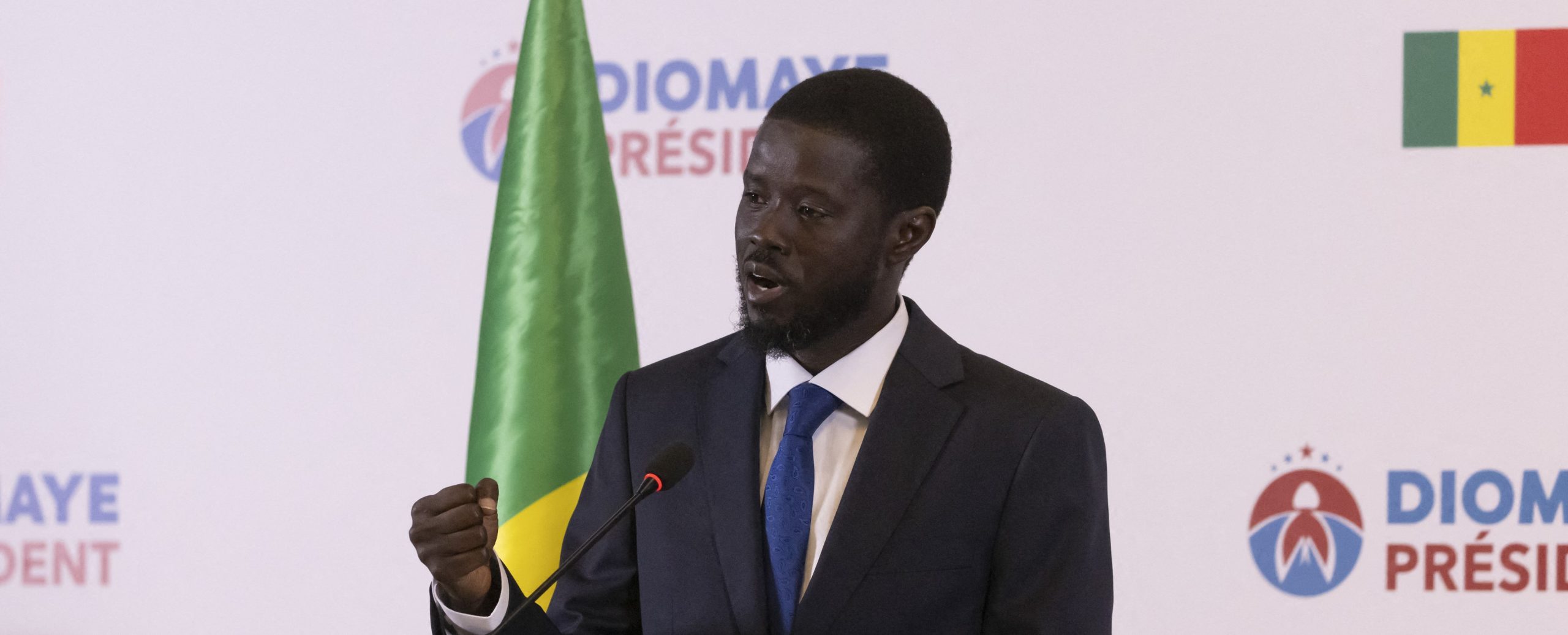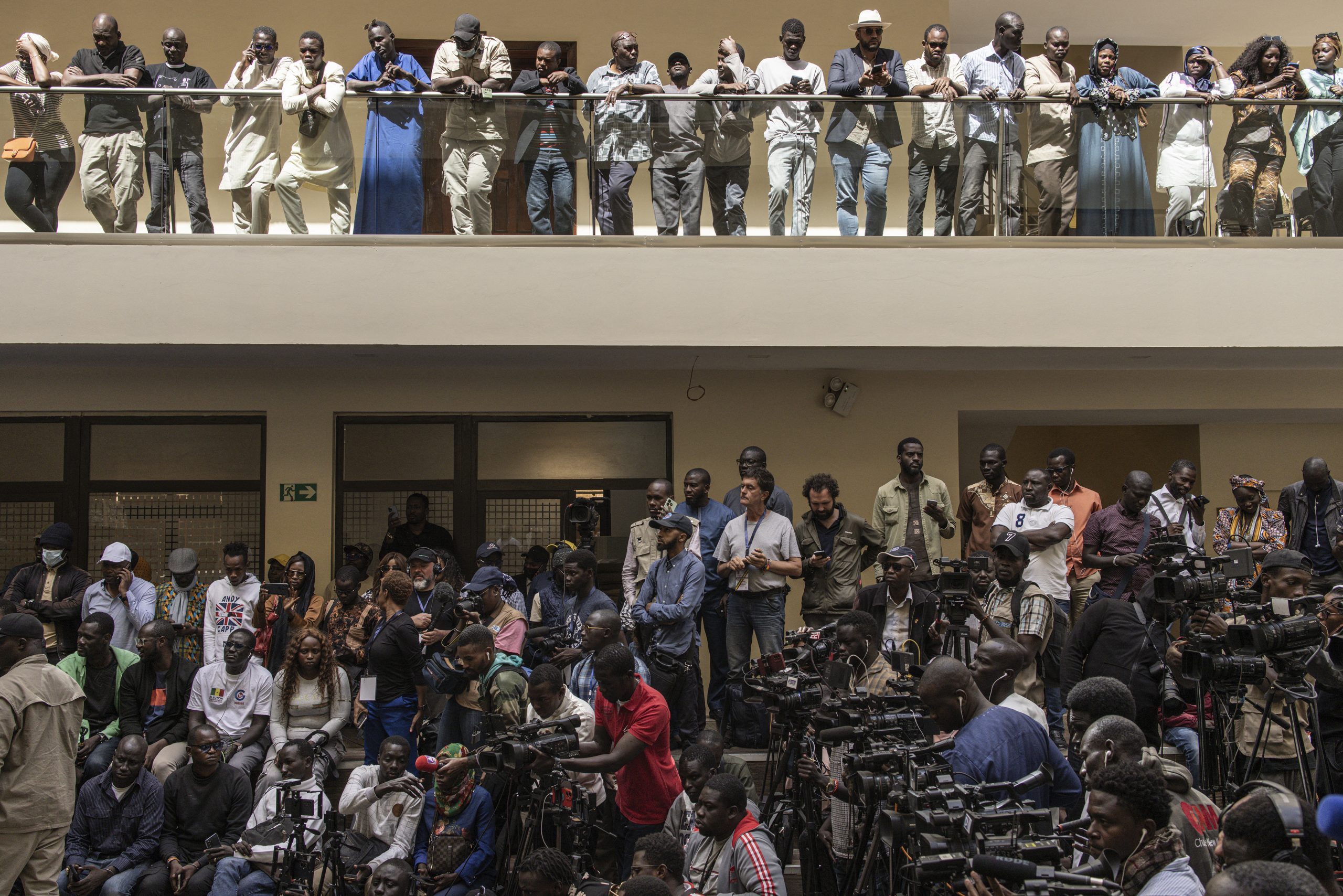
Senegal’s new president, Bassirou Diomaye Faye, addresses his first press conference after being declared winner of Senegal’s presidential election. (Photo: AFP/Marco Longari)
On Sunday, March 24, Senegalese citizens went to the polls en masse to elect their next president. The political context surrounding the race has put the country’s system of institutional checks and balances to the test. Initially scheduled for February 25, the election was eagerly awaited by the 7.3 million citizens (out of a population of 17 million) registered to vote. The election occurred after an initial delay imposed by incumbent President Macky Sall, the passage of legislation resetting the date to December, and the intervention of the Constitutional Council to reject that plan.
This postponement triggered a constitutional crisis, one that Senegalese institutions and the public have thus far weathered with a resilience—attesting to the country’s deeply ingrained democratic norms. These have been the driving force behind Senegal’s multiparty politics for decades.
On the evening of March 24, vote counting began at each polling station, in accordance with Senegal’s electoral code. Provisional results announced by the Commission Nationale de Recensement des Votes (National Commission for the Counting of Votes) indicate that the winner is Bassirou Diomaye Faye, tax inspector and founding member of Patriots du Sénégal (PASTEF) party, who celebrated his 44th birthday on March 25.
The people “have confirmed our country’s status as a major democracy.”
His strongest opponent was former Prime Minister Amadou Ba, who represents the ruling coalition Benno Bokk Yakaar (BBY, United in Hope, in Wolof). Ba and outgoing President Macky Sall sent Faye their congratulations after the announcement. Ba said that the people “have confirmed our country’s status as a major democracy.”
The outcome of the election will have many implications for the content of public policy in Senegal, given that Faye and PASTEF have campaigned on the basis of offering a “rupture” or break from the approaches of the past. However, the process through which Senegalese institutions and the Senegalese people have managed the contention around the holding of the 2024 elections may matter even more for the future of accountable governance. One analyst has even argued that the Constitutional Council’s exercise of its oversight powers to reject the election’s postponement to December has been the most important corrective to “hyper-presidenitalism” in Senegal since the start of the presidential system in 1963.
The Front Runners
The 2024 presidential election was unique in Senegal’s contemporary history, in that the incumbent president did not run. In July 2023, after a long period of uncertainty and political violence, President Macky Sall clarified his intentions to step down at the end of his constitutional two-term limit. The Prime Minister, Amadou Ba, became the candidate of the ruling coalition. Before becoming Prime Minister, Ba has had a distinguished career as Minister of Foreign Affairs, Minister of Economy and Finance, and Director General of Taxes and Domains. He has played critical roles in realizing the economic reforms that President Sall put in place through the Emerging Senegal Plan (PSE), the framework of reference for the Sall administration’s economic and social policies.
Although he represented the ruling coalition, Ba’s nomination as candidate of the Alliance pour la République (APR) and the BBY coalition created tensions for some in the President’s camp, who would have preferred other possible successors within the ruling party. Past experience has shown that Senegalese prime ministers are often able to cultivate clientelist networks and attract supporters independent of those of the president. When Macky Sall was Prime Minister under ex-president Abdoulaye Wade, for example, he built up a network of followers that allowed him to later break away from the ruling party and swiftly establish the APR as an electorally relevant opposition party.
On the other side of the political spectrum, Ousmane Sonko, leader of PASTEF and current mayor of Ziguinchor (Casamance), originally sought to run for president on the party’s label. However, he was barred from running following a controversial conviction of corruption of youth and defamation in 2023. Sonko entrusted the candidacy to his friend and PASTEF co-founder, Bassirou Diomaye Faye, whose candidacy the Constitutional Council validated. Although the government had dissolved PASTEF, Faye’s campaign garnered massive mobilization, particularly among youth.

Journalist and colleagues of former Prime Minister of Senegal and presidential candidate for the ruling Benno Bokk Yakaar (BBY) coalition Amadou Ba wait for his arrival ahead of a press conference in Dakar on March 25, 2024. (Photo: AFP/John Wessels)
Faye, too, was imprisoned on charges related to his critique of the court’s ruling in Sonko’s defamation case. He was released on March 14, 10 days before the election, during a campaign period that was already unusually short. Faye’s release, along with that of Sonko, was made possible by the Parliament’s passage of an amnesty law for acts linked to the demonstrations that have shaken Senegal since 2021. Several candidates encouraged their supporters to rally behind Faye, as did former President Abdoulaye Wade on behalf of the opposition Senegalese Democratic Party (PDS).
The dynamics of support within the coalitions of the leading candidates thus seemed to be characterized by two tendencies: solidarity within the Faye camp and division within the Ba camp. This combination produced a surprising result: the opposition’s victory in the first round.
What Happens Next?
It is still too early to draw definitive conclusions about Senegal’s 2024 presidential election. Compliance with the rules and procedures for verifying official results remains essential for legitimacy. With President Sall’s stepping down, the handover of power within the framework of the rule of law, in the spirit of the tradition of 2000 and 2012, is vital.
The handover of power within the framework of the rule of law, in the spirit of the tradition of 2000 and 2012, is vital.
President Faye will inherit a demanding policy space. Given Senegal’s oil and gas discoveries, Faye called for a strategic approach toward contract negotiations to ensure that citizens reap the benefits. Senegal also faces a high rate of youth unemployment, a dynamic of irregular migration the management of which may require a migration governance policy, and challenges posed by the high cost of living.
Faye presented himself as the “candidate of rupture.” Long before the election, PASTEF leaders had championed ideas such as creating a national currency, strengthening national sovereignty, and combatting corruption. In his first speech after the election, Faye emphasized reconciliation, strengthening the integration of ECOWAS countries, enhancing the political and economic integration of the continent, tapping more effectively into human resources in Senegal, and holding inclusive and sectoral national consultations.
Faye will also face strong demands for governance-related reforms.
Faye will also face strong demands for governance-related reforms. He has signed the National Pact for Good Democratic Governance, which aims to improve governance in the spirit of the recommendations of the 2013 National Commission for Institutional Reform. This program follows in the footsteps of the 2007 Assises Nationales (National Dialogue), which concluded that Senegal has “an imbalance of power, with a strong concentration of power in the hands of the President of the Republic, who has legislative power and ascendancy over the judiciary.”
The new President will have a unique opportunity to address these long-standing concerns. Strategic, decisive, and concrete responses will be essential.
This article is republished from The Conversation under a Creative Commons license. Read the original article.
Additional Resources
- Africa Center for Strategic Studies, “Making Sense of Senegal’s Constitutional Crisis,” Spotlight, February 7, 2024.
- Joseph Siegle and Candace Cook, “Africa’s 2024 Elections: Challenges and Opportunities to Regain Democratic Momentum,” Spotlight, Africa Center for Strategic Studies, January 17, 2024.
- Africa Center for Strategic Studies, “Creating a Culture of Military Professionalism in Senegal,” Spotlight, December 6, 2023.
- Catherine Lena Kelly, “Senegal Pulled Off Another Peaceful Poll. Why this Time the Results May Herald a Big Political Shift,” The Conversation, August 17, 2022.
- Catherine Lena Kelly, “Questions of Justice, Governance, and Rule of Law Surround the Local Elections in Senegal,” Georgetown Journal of International Affairs, April 15, 2022.
More on: Democracy

